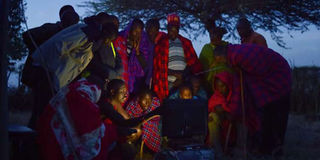Fake news reinforces journalists' primary role as gatekeepers

People watch news near Saikeri town on November 8, 2016. PHOTO | TOBIN JONES | AFP
What you need to know:
Journalists have the power to supplement, alter or cut off certain kinds of information.
This includes what they gather from social media.
With gatekeeping, there seems to be hope things will be much better than in the 2007 and 2013 General Elections.
I defer to all those readers who doubted, or mocked, my claims before I went on leave that I’m, or used to be, a professional mole catcher and composer of mole-catching lyrics.
That shows many of you are hip to the journalistic rule: “If your mother says she loves you, check it out”. The moral of this saying is that journalists should approach everything they’re told with a dose of scepticism, that they should double-check every claim.
It’s not always possible to double-check all claims in a news cycle before publication. Many claims, though, are often allowed to pass without comment even when it’s easy to check them out.
Did, for instance, Industrial Court Judge Hellen Wasilwa insult doctors as claimed by Muturia Mberia, the co-chair of the Inter-Public Universities Councils Consultative Forum?
“Let the Chief Justice restrain his own judges, more so the lady justice from insulting the citizens of this country,” said Mr Mberia in a story published in the Nation on Thursday.
Justice Wasilwa was referring to the “dirty hands” doctrine. The doctors had dirty hands because they were guilty of contempt of court.
They could not, therefore, come to her court seeking orders. In equity, if one does not act in good faith, if one participates in a wrongful act, one may be granted relief resulting from it (“A contempt is same as stinking sewage,” said the judge).
SEVERAL COMPLAINTS
On returning to my desk, I found several complaints revolving around this issue of facts and falsehoods, news spin and fake news, and the need for fact-checking and verification that is central to building trust with readers.
One reader, Githaiga Kairu, took up the issues involved in the doctors’ strike as well as changes in the IEBC.
“After trapping several moles and hunting porcupines you are fully recharged for the election year,” he wrote. “NMG claims to stand for the truth but a few issues don’t add up.
"The doctors’ strike and shenanigans obtaining in courts are a case in point. The strike was declared illegal but it’s not possible to know who’s telling the truth.
“We are treated to those boring press conferences as people die in plural. And in the Judiciary someone seems to use our [judicial system] to sabotage the elections. There is an injunction in every move the IEBC makes.
"The media being the most trusted institution owes Wanjiku a duty of care by setting the right agenda that adds value to wananchi. Some of these events do not augur well for the country.”
EVALUATING CONTENT
These complaints bring to mind the journalists’ role of gatekeeping – evaluating media content to determine its accuracy, importance, relevance and value to readers. Journalists have the power to supplement, alter or cut off certain kinds of information.
This includes what they gather from social media. With gatekeeping, there seems to be hope things will be much better than in the 2007 and 2013 General Elections.
On January 17, I watched "KTN Morning Express", hosted by Michelle Ngele. The participants were Aga Khan University Graduate School of Media and Communications Dean Michael Meyer, media commentator Crispus Yankem, communication consultant Patrick Gathara and Media Council Deputy Chief Executive Officer Victor Bwire.
It was apparent from the discussions that the media are better prepared to cover the 2017 elections.
Mr Meyer, a former Newsweek correspondent, brought a fresh perspective to the way we view the media in Kenya. He praised the standard of journalism.
“Sometimes I’m jealous of Kenyan newspapers when, say, I visit St Louis, or San Diego, or Chicago, or Cleveland,” he said.
“They used to have world-class newspapers but they don’t anymore, and if they could have a Standard or a Nation in those cities, they would be well off.”
He said Kenyan newsrooms are going to be very conscious of balanced reporting, challenging politicians, holding them to account. He said there is demand for honest information; people want someone who is going to separate truth from fiction.
“If they trust what you write, this election will be a superior election,” he concluded.
Send your complaints to [email protected]; call or text 0721989264.





